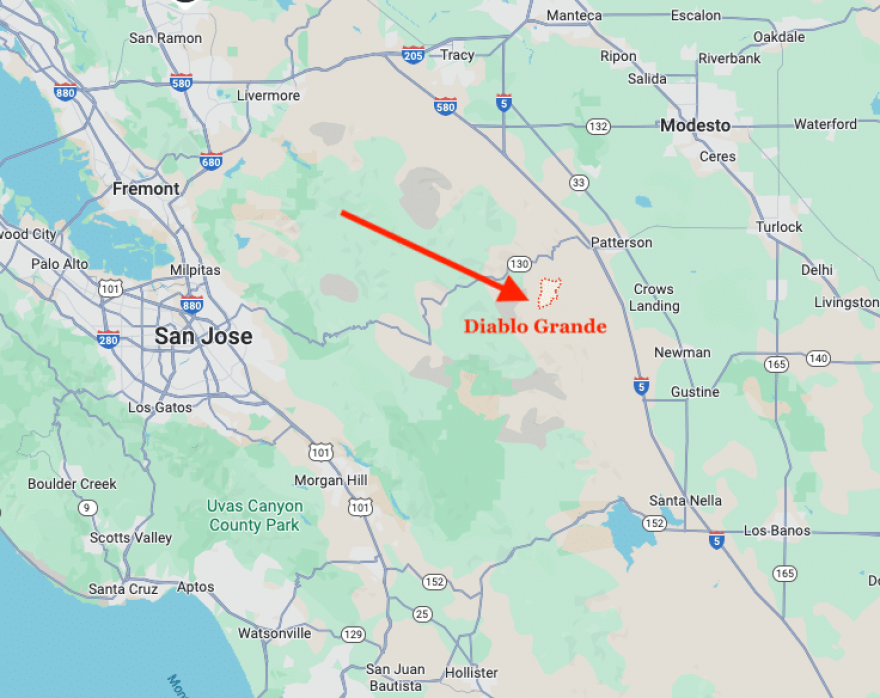This story was originally published by SJV Water.
A water district 200 miles north of Kern County is fighting back against a local agency’s threat to terminate an agreement that has supplied a 600-home development for the past 24 years.
Residents of the development, called Diablo Grande just west of Patterson, approved a 200% increase to their water rates, agreeing to pay $600 a month, in order to make payments on what the Kern County Water Agency (KCWA) has said is a $13 million debt.
But that only bought them six months of supplies as KCWA vowed to end its agreement with Western Hills Water District, which exclusively serves Diablo Grande, on Dec. 31.
An attorney for Western Hills, however, said killing the deal “…is improper and not authorized under the Agreement,” according to a July 14 letter to KCWA. The agreement allows KCWA to suspend water deliveries for lack of payment, but doesn’t allow for termination, the letter from Attorney Colin Pearce states.
KCWA declined to comment, according to a spokesperson.
The letter also lays out Western Hills’ plan to sell all, or part of, the 8,000-acre-foot water contract it owns and use the money to repay KCWA and find a more stable, long-term supply for Diablo Grande residents.
And the letter seeks an accounting of exactly how much excess Western Hills water KCWA sold over the years, to whom and how much it earned on those sales. SJV Water has asked for the same accounting starting June 20 but has, so far, not received that information.
What is known is that KCWA did sell about 61,000 acre feet of excess Western Hill’s water, but not who bought it nor for how much.
“At the very least, revenue produced by KCWA’s sale and transfer of water which belonged to Western Hills could potentially mitigate or offset any outstanding balances owed by Western Hills to KCWA,” Pearce’s letter states.
How and where Western Hills’ water was used is important not just because of the agreement with KCWA, but also because this is state water with state rules attached to it, including where it can be used.
Those “place of use” restrictions are one of the reasons KCWA got involved in this deal more than 20 years ago.
In 1998, the Berrenda Mesa Water District in western Kern County sold Western Hills a portion of its State Water Project contract for 8,000 acre feet a year for $8 million. The water would serve Diablo Grande, which was planned for 5,000 luxury homes and two golf courses.

The Department of Water Resources, which runs the State Water Project, though, didn’t want to add a new contractor and new “place of use” to the system.
That’s when KCWA stepped in.
KCWA administers the State Water Project contract on behalf of 13 local agricultural water districts, so it took over Berrenda Mesa’s contract for the 8,000 acre feet. To get around the place of use restriction, it made a deal to sell its recently purchased Kern River water to Western Hills “in exchange” for the state water.
Western Hills would take its supplies off the California Aqueduct in actual state water and here, in Kern County, KCWA would debit a like amount of its Kern River water that it had stored in the Pioneer Groundwater Bank.
The convoluted deal raised eyebrows even at the time.
Then the housing market crash of 2008 and a later bankruptcy stymied development and Western Hills eventually couldn’t keep up with the annual state transportation/operations and maintenance costs associated with the water.
It stopped reimbursing KCWA for those costs in 2019 and that is the $13 million KCWA says it owes.
“Western Hills has been put in a difficult situation because of the actions of prior developers and promoters of the Diablo Grande development,” attorney Pearce wrote in an email. “But as I pointed out in the letter, the contract Western Hills has with the Kern County Water Agency does give the District a path forward to address the issues raised by the Agency.”
In addition to still owning the contract for 8,000 acre feet, Western Hills was also able to bank some water in Kern County over the year and still has at least 4,000 acre feet of that water remaining.

